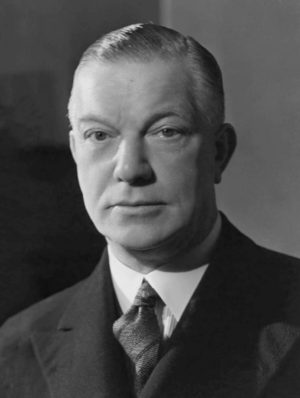Andrew Duncan (businessman) facts for kids
Quick facts for kids
Sir Andrew Duncan
|
|
|---|---|
 |
|
| President of the Board of Trade | |
| In office 5 January 1940 – 3 October 1940 |
|
| Prime Minister | Neville Chamberlain Winston Churchill |
| Preceded by | Oliver Stanley |
| Succeeded by | Oliver Lyttelton |
| In office 29 June 1941 – 4 February 1942 |
|
| Prime Minister | Winston Churchill |
| Preceded by | Oliver Lyttelton |
| Succeeded by | John Jestyn Llewellin |
| Personal details | |
| Born |
Andrew Rae Duncan
3 June 1884 Irvine, Ayrshire, Scotland |
| Died | 30 March 1952 (aged 67) Westminster, London, England |
Sir Andrew Rae Duncan (born June 3, 1884 – died March 30, 1952) was an important British businessman. He became a government leader during World War II. He served twice as the President of the Board of Trade and the Minister of Supply. These were key jobs during the war.
Contents
A Leader in Business
Sir Andrew Duncan was a very successful businessman. He was a director at the Bank of England. This is a very important bank in the UK. He also worked for Imperial Chemical Industries (ICI). ICI was a big company that made chemicals.
From 1927 to 1935, he was the chairman of the Central Electricity Board. This board helped manage electricity for the country. Later, from 1935 to 1945, he led the British Iron and Steel Federation. This group was important for making iron and steel.
Joining the Government
In 1940, Sir Andrew became a Member of Parliament (MP). He represented the City of London. He was part of the "National" group.
He was also made a member of the Cabinet. This meant he was a top advisor to the Prime Minister. He also became a Privy Counsellor. This is a special title given to important people who advise the Queen or King.
Wartime Roles
During World War II, Sir Andrew had two very important jobs. He was the President of the Board of Trade. This role helped manage trade and industry in the country. He also served as the Minister of Supply. This job was about making sure the country had enough weapons and supplies for the war.
Some people worried that he had worked so closely with big companies. They thought it might be hard for him to regulate them fairly. But because of the war, his skills were needed. He stayed in his roles and did not face any problems.
After the war, he returned to the Iron and Steel Federation. He worked to stop the Labour government from taking over the steel industry.
Awards and Honors
Sir Andrew Duncan received many honors for his work. He was made a Knight in 1921. This gave him the title "Sir." In 1938, he was given an even higher honor. He became a Knight Grand Cross of the Order of the British Empire (GBE).
He also received an award from Italy. It was called the Order of Saints Maurice and Lazarus.
The Duncan Commission
Sir Andrew's work was not just in the UK. In 1926, the Canadian Prime Minister, William Lyon Mackenzie King, asked for his help. There was a movement in Canada called the Maritime Rights Movement. People in the Maritime provinces felt they were not being treated fairly.
Sir Andrew was asked to lead a special group. This group was called the Royal Commission on Maritime Claims. It became known as the "Duncan Commission." It looked into the problems and suggested ways to help the Maritime provinces.
Personal Life
In 1916, Sir Andrew married Anne Jordan. They had two sons together. Sadly, one of their sons was killed in action in 1940 during the war. Sir Andrew Duncan passed away peacefully in his sleep on March 30, 1952. He was 67 years old.
 | Jewel Prestage |
 | Ella Baker |
 | Fannie Lou Hamer |

